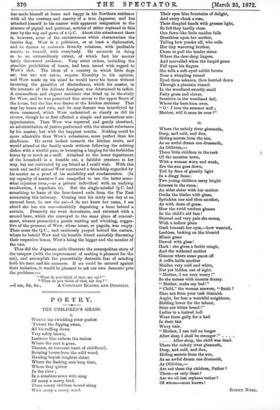POETRY.
THE CHILDREN'S GRASS.
I.
WHERE the twinkling river pushes
'Thwart the dipping swan, All his ruffling down Very softly blown, Lustrous blue reflects the rushes
Where the coot is gone,
Thames, an innocent heart of childhood,
Buoying lovers from the wild wood, Hearing boyish laughter chime
Where the flashing oars keep time, Where they quiver In the river ; In a sunshine sown with song Of many a merry bird, Three sunny children bound along With many a merry word. Their eyes blue fountains of delight, And every cheek a rose, Their dimpled hands with grasses light, So full they hardly close.
One fawn-like little maiden falls Breathless upon her mother, Telling how yonder elf, who calls Her tiny wavering brother, Chose to pull the tender stems Where the dew-drop lingers, And marvelled when the limpid gems Fell upon his fingers.
She tells a soft-eyed rabbit brown Near a wimpling runnel Eyed them askance, then hurried down Through a plantain tunnel.
In the woodland sweetly smell Fairy grass and clover, Sensitive in the woodland dell, Where the bees bum over, " 0 ! I love the summer well ; Mother, will it soon be over ?"
Where the unholy river gleameth, Deep, and cold, and dun, Hiding secrets from the sun, As an awful dream one dreameth,
As Oblivion,—
Three little children in the reek Of the monster town, With a woman worn and weak, Ere the sun goes down, Toil by flare of ghastly light In a dingy fume: Two young children carry bright Grasses in the room: An elder sister with her mother
Decks the blades with glass,
Sprinkles one and then another,
As with dews of grass.
How the vivid verdure gleams In the child's old face!
Starved and very pale she seems, With a hollow place Dark beneath her eyes,--how wearied, Lashless, looking on the bleared Mimic grass Dewed with glass!
Hark ! she gives a feeble cough, And the withered mother Glances where some paces off A coffin holds another Maiden very cold and white, Not yet hidden out of sight.
"Mother, I am very weary !"
So she moans with accents dreary.
"Mother, make my bed!" "Child," the woman answers, "finish r Dare not from your task diminish Aught, for fear a watchful neighbour, Bidding lower for the labour, Seize our bitter bread !"
Ladies in a lustred hall Wear them gaily for a ball In their fair Wavy hair.
"Mother, I can toil no longer After sleep I shall be stronger !" . . .
. . . . After sleep, the child was dead.
There the unholy river gleameth, Deep, and cold, and dun, Hiding secrets from the sun, As an awful dream one dreameth,
As Oblivion,—
Are not these thy children, Father ?
These—or only those?
Are we all lost orphans rather?
Of whom—none knows! RODEN NOEL.-


































 Previous page
Previous page